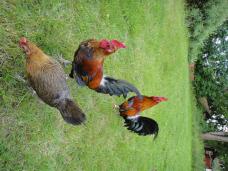
Personality is defined as behavioural responses that differ between individuals but are stable within individuals over time and/or contexts. It is well documented that individuals of the same species can display constant differences in behaviour, and have personality. These constant differences have now been shown in a broad range of species, ranging from mammals to even fish and insects. Other terms such as coping styles, temperaments and behavioural types are used synonymously with personality.
However...
It may be counter-intuitive for complex behaviours to be stable, since plastic behaviours would allow an individual to behave optimally to different situations and thus improve fitness. Variations in behaviours between individuals that show consistency within individuals can be adaptive if personality has a positive effect on the animal’s fitness. This could occur if different personality types have differential success in different environments.
There are different theories as to why individuals have personality.
- Personality can be adaptive if personality has a positive effect on the animal’s fitness. This could occur if different personality types have differential success in different environments .
- Another explanation offered to why personalities can differ consistently between individuals could be due to limitations in plasticity. Some behaviours can be strongly linked to underlying neurobiological and physiological factors such as growth rates. The strong links to the underlying factors can then limit the plasticity of the behaviour.
The ontogeny of personality
Despite the definition of consistency in behavioural responces and the fact that individuals show greater limitations in behavioural plasticity than previously assumed, a degree of plasticity in the personality of individuals would still be
Most of the few studies that have investigated the ontogeny of personality show that there are stages of instability in personality, during an individual’s life. In some studies, the period of instability is extreme such as before and after metamorphism. For example, juveniles and adult insects occupy very different niches before and after metamorphism as the animals usually have different environmental and physiological needs.
Studies on animals that undergo less extreme changes in life stages, such as sexual maturation, found that many behaviours exhibited by the animals were stable over time. Even though the change during sexual maturation may not be as extreme as metamorphism, adults and juveniles can still fill different niches, which then effects the animal’s behaviours. Also, juveniles spend much more energy on growth, whilst the adults invest more energy on reproduction. Both life-history traits typically differ among individuals and are predicted to explain variation in personality among individuals.
It is not only developmental changes that can affect the stability of personality. Also, what an individual experiences early in its development has been suggested to have an effect. Studies have found that weaning and litter size can have an effect on the development of an individual's personality.
Aim
I investigated:
- how personality develops over time,
- at which time points behaviours and, therefore personality, stabilises in individuals of red junglefowl of both sexes.
This was done by observing the behavioural responses of red junglefowl at several different ages in a range of behavioural assays typically used to score personality variation. I would expect periods of instability in behaviour around the life stages that an individual goes through. In red jungle fowl, I predict these stages to be weaning at approximately 4-6 weeks and sexual maturity at approximately 20 weeks.
Responsible for this page:
Director of undergraduate studies Biology
Last updated:
05/22/13
